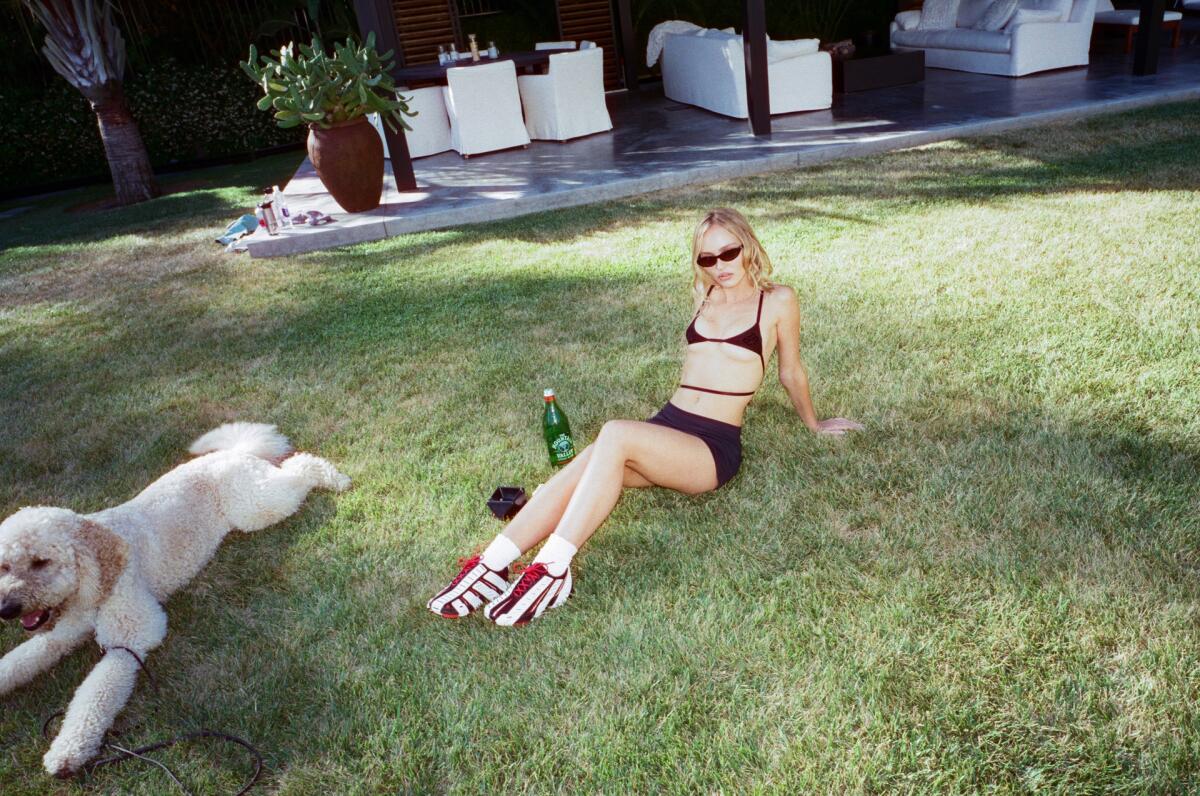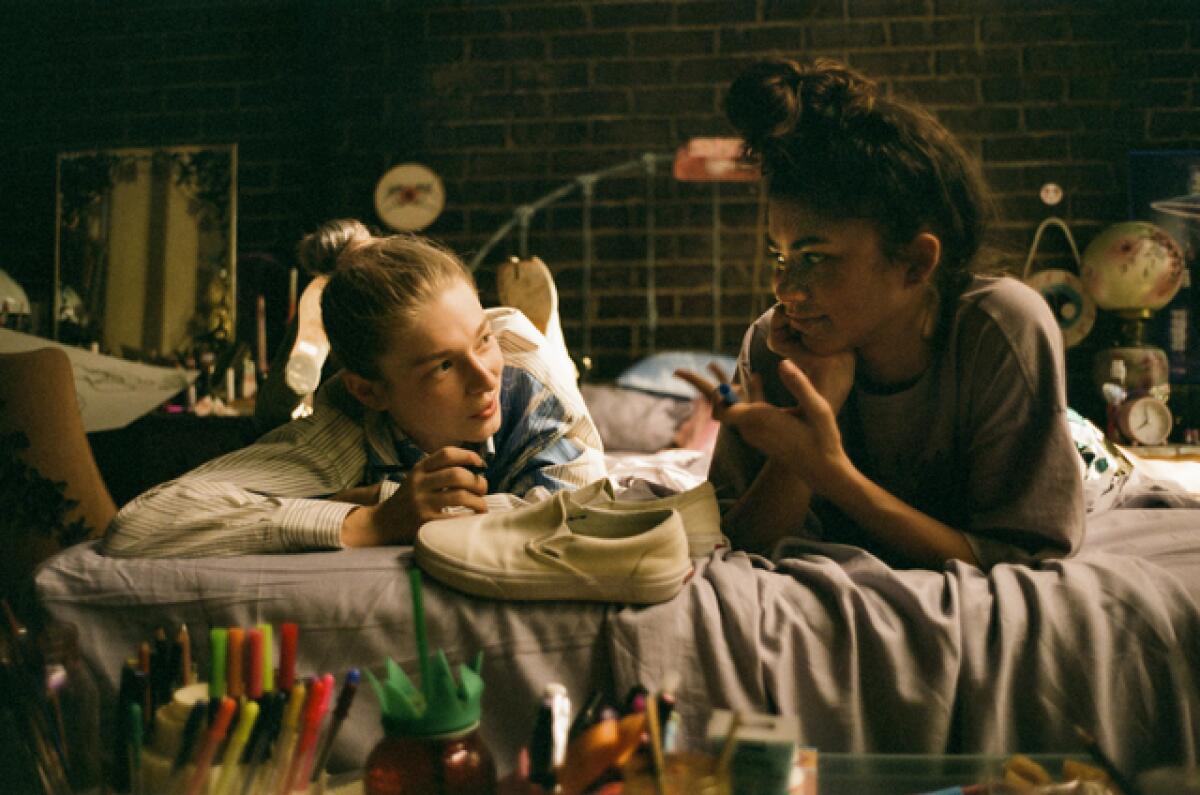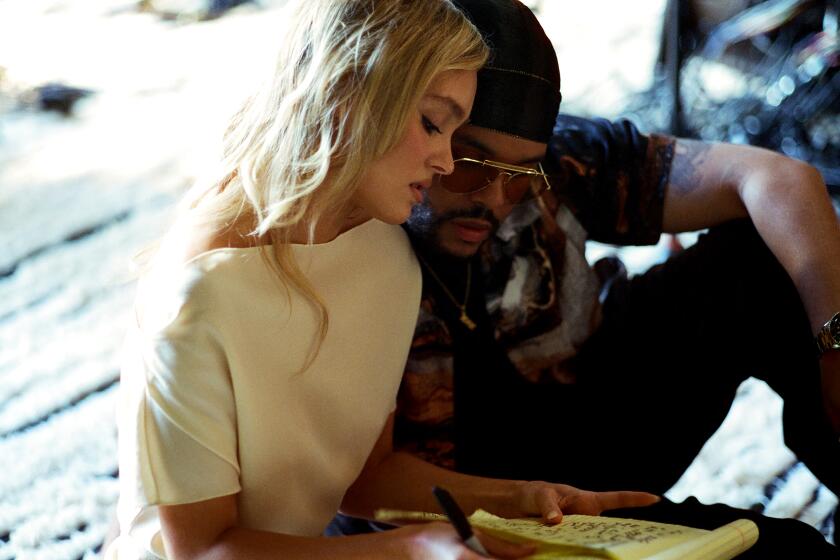Commentary: ‘The Idol’ is no ‘Euphoria,’ but it reveals a similar misogyny

- Share via
Hate watch alert: there’s just one episode left of “The Idol,” HBO’s salacious pop star drama that became a water-cooler show for all the wrong reasons. The hyped series from “Euphoria” writer and director Sam Levinson and singer the Weeknd (aka Abel Tesfaye) ends its disastrous run next Sunday, but it’s already been deemed a bomb of epic proportions by critics and audiences alike, and the show’s title is now a cautionary descriptor: “But is it like ‘The Idol’ bad?”
The hour-long drama follows mega pop star Jocelyn (Lily-Rose Depp) after a public breakdown that’s achingly similar to that of real-life pop star Britney Spears. Jocelyn is teetering on the edge of total failure when she inexplicably falls for club owner Tedros (Tesfaye), a manipulative L.A. skeezeball and wannabe record producer with a minor cult following. He and his entourage of impossibly hot hardbodies and ne’er do wells move into her mansion, taking over her life and career. From there, it’s a grab bag of salaciousness and cliches amplified by bad writing and laughable performances. A star is unborn in a messy story that loosely resembles “Fifty Shades of Grey,” and “Spinal Tap,” minus the irony and guitars. Think “Showgirls,” just not as good.
Perhaps “The Idol” was meant as a satire about the excesses of fame, the absurdity of celebrity worship and the recording industry’s shameless objectification of underage talent (Jocelyn started her career as a kid). But it’s hard to tell since the show celebrates all three of these things with little to no sarcasm, nuance or clothing.

Jocelyn’s “wardrobe” consists of designer thongs and the occasional strip of material to cover her nipples. The series opens with her splayed out for a photo shoot, insisting that she be able to show as much skin as she’d like despite the protests of the shoot’s intimacy coordinator. The show practically pops a disclaimer on the screen: “Jocelyn’s forthcoming objectification in this series is in fact an empowering feminist statement.”
A naked attempt to lower the median age of the Cannes Film Festival, ‘The Idol’ is not as shocking as it thinks it is.
The voyeuristic, adult male gaze into the life of sexy, young, vulnerable girls was better hidden in “Euphoria,” the award-winning HBO series written and directed by Levinson. It too had a lurid and queasy fascination with sex between minors and other young folks, girls in trouble and abuse of women, and it romanticized reckless drug use. But the series was so well written and executed that the criticisms it received were eventually drowned out by the strength of its narrative, its character development and the excellent performances from actors such as Zendaya and Sydney Sweeney.
“The Idol” lays bare the misogyny and exploitation that was lurking in the recesses of “Euphoria.” The abuse Jocelyn endures at the hands of Tedros, whether it’s under the guise of consensual rough sex or wicked manipulation, is so blatantly hateful toward her that it calls into question the intentions behind “Euphoria.” Was that series an elevated yet unvarnished look at messed-up teens, or a disturbing glimpse into how certain adult men see them?

“The Idol” is replete with acts of humiliation. By the fourth episode, Tedros has already beaten Jocelyn with a hairbrush when he blindfolds her during a recording session and performs a sex act on her in front of the crew. The goal is to get orgasmic vocals out of her and it works. Music producer Mike Dean (who plays himself), watches with a smirk, and so does the camera.
Empathy for Jocelyn is in short order, even when the show tries to understand the pressure that she’s under to produce another hit. Her close assistant is concerned that Tedros is treating her like an object. Her lover counters her assessment with this hackneyed line: “She’s not a human being, she’s a star, and stars belong to the world.” And that’s one of the more reflective moments in “The Idol.”
‘The Idol’ star Lily-Rose Depp opened up about working with Abel ‘the Weeknd’ Tesfaye ahead of the premiere of the controversial HBO series.
“The Idol” promised good and original music, but that doesn’t happen either. It’s just drawn-out recording sessions, with snippets of songs repeated. It’s unquestionably the Weeknd’s falsetto vocals and bleak, darkly romantic music and production, but his usual playfulness or irony is flattened by the drama it’s set to. And if it’s not his own music, it’s an unimaginative choice: When Jocelyn’s ex enters the picture and Tedros feels threatened, we hear the Weeknd’s cover of John Lennon’s “Jealous Guy.” Yes, it’s that literal.
Tesfaye’s questionable acting skills are at the forefront of the conversation these days (check out the kung fu moves from Sunday’s episode). Depp’s contribution is less clear because she’s rarely given the chance to do anything more than flash the flesh or please Tedros. It’s a shame because there are moments of potential in her portrayal of a frustrated artist who’s being pushed into a pop tart role. Perhaps she felt a similar frustration and disgust as a competent actor stuffed into a demeaning role, not to mention a tiny bandeau top.
“The Idol” is so bad that it’s given HBO a new distinction: home of the year’s most ill-conceived prestige drama. It’s doubtful anything in the finale can redeem the show, but more than that, its existence may change the way we think about “Euphoria.”
More to Read
The complete guide to home viewing
Get Screen Gab for everything about the TV shows and streaming movies everyone’s talking about.
You may occasionally receive promotional content from the Los Angeles Times.








